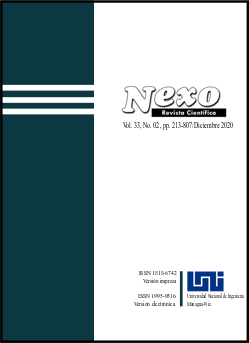Change in sowing date combined with water stress affects canola seed oil and fatty acid composition
DOI:
https://doi.org/10.5377/nexo.v33i02.10776Keywords:
Canola, delayed cultivation, fatty acids composition, drought stress, oil contentAbstract
To study the effect of sowing date and water stress on qualitative traits of canola, an experiment was conducted for two years in Iran. The sowing date and irrigation were in two levels as the main factors, and five canola cultivars and hybrids were included as the subfactors. In normal sowing date and normal irrigation conditions, The Tassilo hybrid with a high seed yield and seed oil yield (6139 and 2905 kg ha-1, respectively) can be effective in the cultivation of canola in temperate cold regions with dry and semi-arid climates. In the conditions of delayed cultivation and late season drought stress, the same hybrid with the highest seed yield and seed oil yield (2935 and 1273 kg ha-1, respectively) and the least amount of erucic acid (0.4%) and glucosinolate content (22.9 μmol g-1) is recommended for the delayed cultivation conditions together with late season drought stress.
Downloads
Downloads
Published
How to Cite
Issue
Section
License
Copyright (c) 2021 Array

This work is licensed under a Creative Commons Attribution 4.0 International License.
The authors who publish in Nexo Scientific Journal agree to the following terms:
- Authors retain the copyright and grant the journal the right of the first publication under the license Creative Commons Attribution License https://creativecommons.org/licenses/by/3.0/, which allows others to share the work with a recognition of the authorship of the work and the initial publication in Nexo Scientific Journal.
- Authors may separately establish additional agreements for the non-exclusive distribution of the version of the work published in the journal (for example, in an institutional repository or a book), with the recognition of the initial publication in Nexo Scientific Journal.
- Authors are allowed and encouraged to disseminate their works electronically (for example, in institutional repositories or in their own website) before and during the submission process, as it can lead to productive exchanges, as well as earlier and greater citation of published works.











